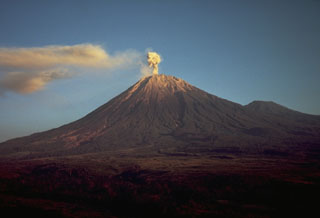Report on Semeru (Indonesia) — September 2002
Bulletin of the Global Volcanism Network, vol. 27, no. 9 (September 2002)
Managing Editor: Richard Wunderman.
Semeru (Indonesia) Higher-than-normal seismic and explosive activity during June-September 2002
Please cite this report as:
Global Volcanism Program, 2002. Report on Semeru (Indonesia) (Wunderman, R., ed.). Bulletin of the Global Volcanism Network, 27:9. Smithsonian Institution. https://doi.org/10.5479/si.GVP.BGVN200209-263300
Semeru
Indonesia
8.108°S, 112.922°E; summit elev. 3657 m
All times are local (unless otherwise noted)
During 17 June-8 September, activity at Semeru was higher than normal. Seismicity was dominated by explosion and avalanche earthquakes. Volcanic and tectonic earthquakes also occurred, along with occasional tremor episodes (table 9). During June and July, and on 6 August, when fog did not obscure the view, observers reported that lava avalanches traveled toward Besuk Kembar river at distances of ~750 m from the crater rim. At times during July explosions produced white ash plumes that reached 300-500 m above the crater. During mid-August to early September, a white-gray ash plume rose 400-500 m above the crater. On 8 September at 1947 an ash explosion ejected glowing material ~150 m toward the upper stream of Besuk Kembar river. Semeru remained at Alert Level 2.
Table 9. Earthquakes and tremor registered at Semeru during 17 June-8 September 2002. Courtesy VSI.
| Date | Volcanic | Explosion | Avalanche | Tremor (max. amp.) |
| 17 Jun-23 Jun 2002 | -- | 670 | 75 | -- |
| 24 Jun-30 Jun 2002 | -- | 782 | 83 | 1 |
| 01 Jul-07 Jul 2002 | -- | 714 | 76 | 1 |
| 08 Jul-14 Jul 2002 | -- | 898 | 77 | -- |
| 15 Jul-21 Jul 2002 | -- | 670 | 83 | -- |
| 22 Jul-28 Jul 2002 | 4 B-type | 696 | 88 | 3 (1-4 mm) |
| 29 Jul-04 Aug 2002 | -- | 744 | 92 | (1-4 mm) |
| 05 Aug-11 Aug 2002 | 1 B-type | 668 | 106 | -- |
| 12 Aug-18 Aug 2002 | -- | 696 | 67 | -- |
| 19 Aug-25 Aug 2002 | 2 A-type | 734 | 108 | -- |
| 26 Aug-01 Sep 2002 | 1 B-type | 845 | 115 | -- |
| 02 Sep-08 Sep 2002 | 1 A-type | 640 | 57 | -- |
Geological Summary. Semeru, the highest volcano on Java, and one of its most active, lies at the southern end of a volcanic massif extending north to the Tengger caldera. The steep-sided volcano, also referred to as Mahameru (Great Mountain), rises above coastal plains to the south. Gunung Semeru was constructed south of the overlapping Ajek-ajek and Jambangan calderas. A line of lake-filled maars was constructed along a N-S trend cutting through the summit, and cinder cones and lava domes occupy the eastern and NE flanks. Summit topography is complicated by the shifting of craters from NW to SE. Frequent 19th and 20th century eruptions were dominated by small-to-moderate explosions from the summit crater, with occasional lava flows and larger explosive eruptions accompanied by pyroclastic flows that have reached the lower flanks of the volcano.
Information Contacts: Volcanological Survey of Indonesia (VSI), Jalan Diponegoro No. 57, Bandung 40122, Indonesia (URL: http://www.vsi.esdm.go.id/).

